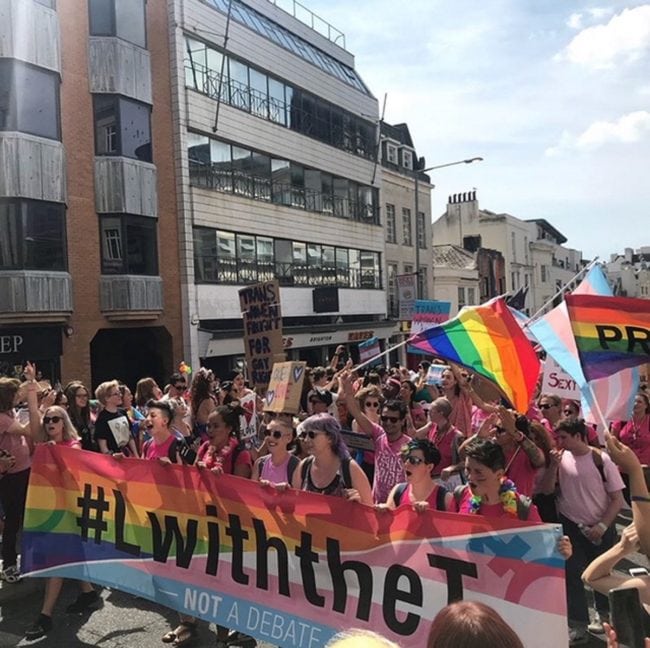Gender Recognition Act reform: I’m non-binary and this is why I need your help

The UK’s gender recognition laws are failing trans people. The current procedures are expensive, lengthy and overly medicalised. What’s more, they are restricted to trans people over the age of 18 and there are no mechanisms for legal recognition beyond the gender binary.
At the moment, myself and other non-binary people can’t receive any identification in line with our gender identity. Many other trans people, including those over 18, have struggled with a system that doesn’t respect the autonomy of trans people.
But, we have a chance to change this and we need you to take action, too. The government’s consultation on the Gender Recognition Act 2004 closes on Friday, October 19. This is a once-in-a-generation opportunity to bring in progressive legislation and it’s vital that trans people and our allies take the 10 minutes necessary to answer the consultation.
What is the Gender Recognition Act?
The Gender Recognition Act (GRA) is a piece of law in the UK allowing trans people to change their legal gender on their birth certificate, by providing them a Gender Recognition Certificate. It was a groundbreaking piece of legislation when passed 14 years ago but has fallen into disrepair and urgently needs to be fixed. We’ve recently seen a leap forward in trans rights globally, with countries such as Portugal bringing in models of gender recognition that aren’t overly-reliant on medical pathways.
To apply under the current process, you first have to live for two years in your “acquired” gender and have a formal diagnosis of gender dysphoria. You then submit an application along with two pieces of medical evidence to an anonymous panel that you never meet and whose decision you can’t appeal. You have to be over 18 to access the service and you can only change your gender marker from female to male or vice-versa. At the moment there’s no legal recognition of non-binary people in the UK.
While the current consultation is only for England and Wales, the Scottish government held a similar consultation on their version of the GRA that closed in March this year. The first results have been released in the last couple of weeks and they paint a positive picture: A significant number of people are in favour of making gender recognition less restrictive and inclusive of both non-binary people and trans people under 18.
What do we need?
We need a progressive system that respects trans people, instead of making them jump through hoops. Around the world, a number of countries have brought in gender recognition by what is called statutory declaration. Instead of having to go through a very medicalised process, trans people sign a legal document in front of a witness such as a solicitor, saying that they know what they’re doing and affirming their well-considered decision.
If we look to countries like Ireland, we see that we can have a process that respects the trans community, with absolutely no impact on the rest of society. The sky hasn’t fallen in—in fact, the only change has been that trans people have been able to access legal recognition with less difficulty.
Non-binary people in the UK still can’t get identification that’s in line with their gender identity. We’ve seen a range of countries, from Canada to Pakistan, introduce ‘X’ markers for documents like birth certificates, driving licences and passports. The consultation is a chance for the government to catch up with what’s happening across the globe. It must ensure the GRA is as progressive in this decade as it was in the last by granting legal recognition to non-binary people.
The new reforms need to be inclusive of young people under the age of 18, who are excluded from the current process. At 16, you can marry and join the army but you can’t have a birth certificate that recognises your authentic self. The Scottish government has stated that 16 and 17 year olds should be able to access the gender recognition process, so by introducing similar reforms in England and Wales, this would be uniform across Britain.
What can you do?
You can tell your MP that this consultation is happening, as many won’t even know. The Gendered Intelligence site has an easy form you can use to do so, which will only take a minute of your time.
We have more information about the GRA on our website, along with some guidance on writing a response. Anyone can complete the consultation; you don’t need to be trans or even answer all the questions!

The survey is a great chance to be an ally to trans and non-binary people
It’s important that as many trans people, their families and friends and allies of the community take 10 minutes to fill out the form. We have the opportunity to make legal gender recognition easier and more affordable for all trans people, but we need you to take action.
Sascha Amel-Kheir is a non-binary activist and works at Gendered Intelligence.

